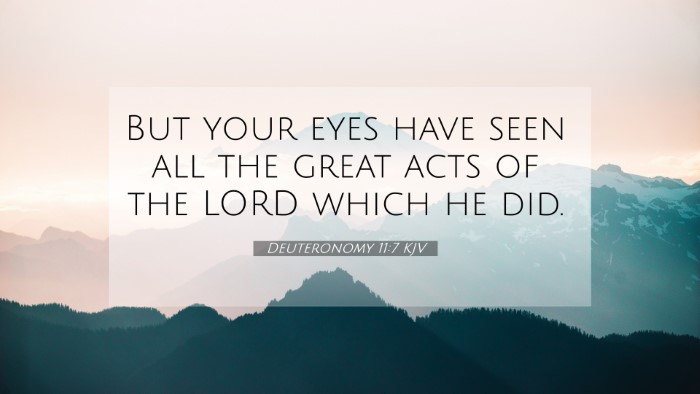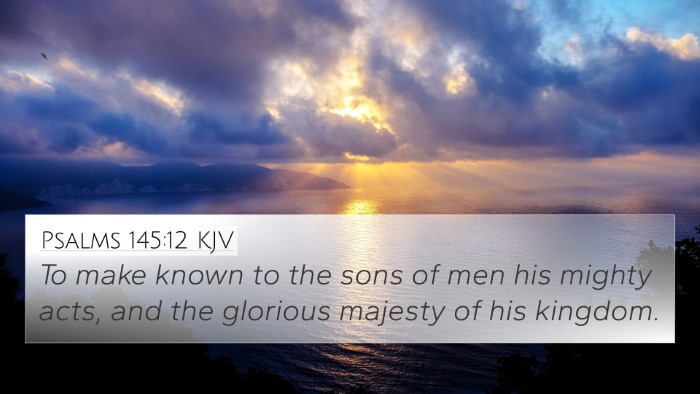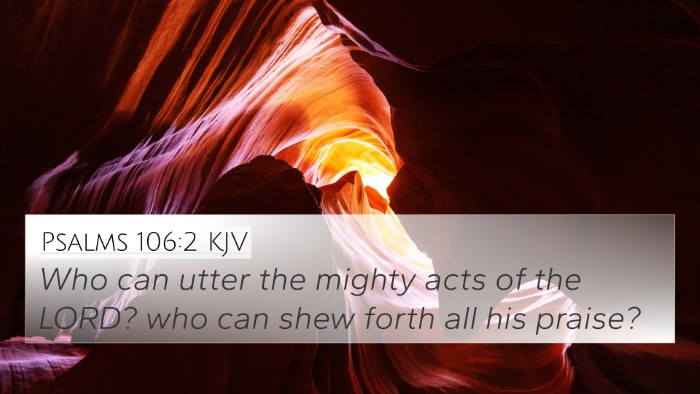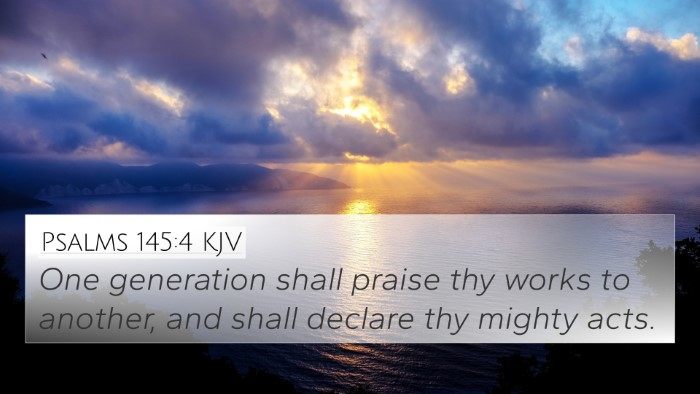Understanding Deuteronomy 11:7
Verse: "But your eyes have seen all the great acts of the Lord that he did." (Deuteronomy 11:7)
Summary of Meaning
Deuteronomy 11:7 emphasizes the importance of witnessing God's mighty acts and serves as a reminder for the Israelites to remember their experiences of divine intervention. This verse encapsulates the necessity of acknowledging God's work in history as a foundation for faith and obedience.
Insights from Public Domain Commentaries
-
Matthew Henry:
Henry notes that this verse calls for reflection on the astonishing wonders that God performed among Israel. It's a call to remember both the miracles and the lessons they imparted, reinforcing the notion that seeing these acts should inspire a deep trust in divine providence and guidance.
-
Albert Barnes:
Barnes elaborates on the idea that witnessing God's great deeds should have a profound impact on the hearts of the observers. He emphasizes the need for personal testimony and experience with God as a basis for faith, encouraging believers to hold on to their own experiences of His goodness.
-
Adam Clarke:
Clarke highlights the context of this verse within Moses’ farewell address. He reiterates the significance of God's miracles in shaping Israel’s identity. Clarke argues that these acts serve as a powerful reminder of God's covenant faithfulness, urging the Israelites to remain steadfast in their commitment to Him.
Thematic Connections
This verse can be linked thematically to several key Biblical ideas:
- Faith and Obedience: The act of remembering God's deeds strengthens faith and compels obedience (Hebrews 11:1).
- God's Faithfulness: Reflecting on past deliverances affirms God's unwavering promise (Psalm 89:8).
- The Role of Memory: The importance of remembering God's work is echoed throughout Scripture (Deuteronomy 6:7).
Cross-References for Deuteronomy 11:7
Several verses throughout the Bible connect thematically and contextually with Deuteronomy 11:7:
- Psalm 78:4: "We will not hide them from their children, but tell to the coming generation the glorious deeds of the Lord..."
- Exodus 13:14: "...when your son asks you in time to come, 'What does this mean?' you shall say to him..."
- Joshua 4:6-7: "That this may be a sign among you... that the waters of the Jordan were cut off..."
- 1 Samuel 12:24: "Only fear the Lord and serve him faithfully with all your heart. For consider what great things he has done for you."
- Isaiah 46:9: "Remember the former things of old; for I am God, and there is no other..."
- Lamentations 3:20-23: "My soul continually remembers it and is bowed down within me..."
- Hebrews 3:19: "So we see that they could not enter in because of unbelief."
- 2 Peter 3:2: "That you should remember the words which were spoken before by the holy prophets..."
- Revelation 2:5: "...remember therefore from where you have fallen; repent, and do the works you did at first..."
- Philippians 4:8: "Finally, brothers, whatever is true, whatever is honorable, whatever is just, whatever is pure..."
Practical Applications
Understanding and reflecting on Deuteronomy 11:7 can inspire several practical applications in a believer's life:
- Encouraging personal reflection on past experiences of God's faithfulness.
- Sharing testimonies within faith communities to strengthen collective faith.
- Establishing memorials or rituals to commemorate God's interventions.
Tools for Bible Cross-Referencing
Utilizing resources for scripture cross-referencing can deepen the understanding of verses. Some useful tools and methods include:
- Bible Concordances: Tools that list words and phrases to help locate relevant verses.
- Bible Cross-Reference Guides: Publications or software that map themes across scriptures.
- Cross-Reference Systems: Systems developed by scholars to navigate connections between texts.
- Bible Study Methods: Techniques that incorporate cross-referencing for group or individual studies.
Conclusion
Deuteronomy 11:7 serves as a significant reminder for individuals and communities to remember and reflect upon the mighty acts of God throughout history. Through insightful commentary and thematic connections across the Bible, believers are encouraged to strengthen their faith and understanding by recognizing how different scriptures interconnect and reinforce God's nature and promises.








